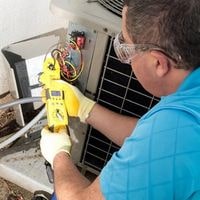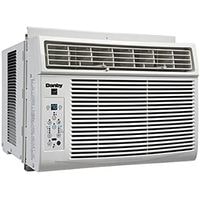Danby air conditioner troubleshooting. Before you know it, your warm-weather months will be a great time for those who reside in your residential building to crank up their air conditioning systems.
As a result, it’s only natural for you to want to start off the warmer months in a comfortable setting, which means having a problem-free air conditioner before one arises.
You can achieve your goal of smoothly operating air conditioner units and happy homeowners by performing some air conditioning maintenance and troubleshooting missions.
Danby air conditioner troubleshooting
Here we will discuss some common issues and solutions for Danby air conditioner troubleshooting.
AC Won’t Run
When you begin your air conditioning troubleshooting process, one of the worst nightmares you could experience is when the unit doesn’t produce any sound or feel anything.
When this happens, it could be because there’s a problem with the fuse or circuit breaker and this means that either a trip switch or blown fuse will probably have to be reset.
If the air filter is gunked up, none of the cold air from your AC can get into your home. The AC will try to blow its cool air into a filter that’s all caked up with dirt and grime, which can clog the system if it gets really bad.
Shut off any fans and turn on the AC to see how it performs; if you notice that no air is coming out of the vents at all, then you may have a clogged air filter.
Compressor Fails to Operate
The compressor may be faulty, but this is often the case. Before replacing the component, discover if there are other problems.
Such a commonly defective component as the overload protector or compressor capacitor should be checked first.
If one of them is faulty, you can replace it without having to fully replace the device itself and without having to call upon an expensive professional for assistance.
The high-pressure safety device protects the refrigeration system from excessive pressure.
If the high-pressure safety device is defective, it may fail to shut off the gas supply to the appliance, causing a gas leak.
The high-pressure safety device is easily checked and inexpensive to replace. However, you should check the other components in your AC that are frequently failing before replacing this part — particularly the electronic control board and the pressure switch itself.
Defective Remote Control
If you’ve tried changing the batteries in the remote without success then you may find that it is actually the remote itself at fault.
If a replacement remote is not readily to hand but it is still possible to operate your air conditioner manually.
You might want to try reading some online instructions or contact customer support, or simply wait until a new remote control arrives before continuing with any other experiments.
If one component of the main control board is damaged, everything will not work. This receiver receives infrared signals from the remote control.
If you suspect the main control board is broken, replace it because installing a new component during product manufacturing is generally less expensive than repairing or replacing the entire product later on down the road.
AC fan Malfunctioning
A dual shaft fan motor is used in most modern air conditioning and heating systems – including split air conditioners.
These motors, having two fan blades, were originally invented as an alternative to single-speed motors that are noisier and need to run faster when the energy demand is high.
Dual shaft motors don’t make too much noise, so they can be used for large double glazed windows where there is less noise insulation.
It may sound counterintuitive but this design actually helps save more electricity over a period of time!
Try turning the blade by hand. Does the blade turn freely? The motor has to be replaced if it is not working properly.
But if it does turn with ease, then you need to check that the power is actually going to the motor because another possibility could be that there is an issue with one of the wires or even internal contact points inside of the motor itself.
AC Won’t Turning Off
As air passes through the coils of an AC, heat transfers from the air to the coils and is carried away by a refrigerant. Heat cannot be transferred well if the coils are dirty. As dirt builds up on the coils, your AC has to work overtime to get rid of excess heat.
If dirt collects in high quantities, your AC will be unable to maintain a cool temperature for your home and constantly run to compensate for it.
Check your AC’s condenser coil(s)’s condition regularly and consider replacing the filter(s).
When the settings on your thermostat are too hot when you are sitting comfortably in your room, it’s a good indication that there may be an issue with the primary air conditioning control board.
The unit might not even accept a new main control board without all of its components being taken care of, so in this case, one must first check any commonly defective parts before replacing the main control board. Replace them if they are indeed defective.
AC’s Excessive Noise
When the compressor is making a buzzing noise, it’s time to replace it. Compressors are built to last and if you take good care of yours, they can often still be functional years after it becomes noisy.
But, if you’d prefer to have a new one installed instead, have a professional do the work
When you hear loud buzzing in your fan, it could mean that the bearings have gone bad. In order to make sure you get rid of this problem on time, replace your dual shaft fan motor immediately with a new one.
Related Guides
